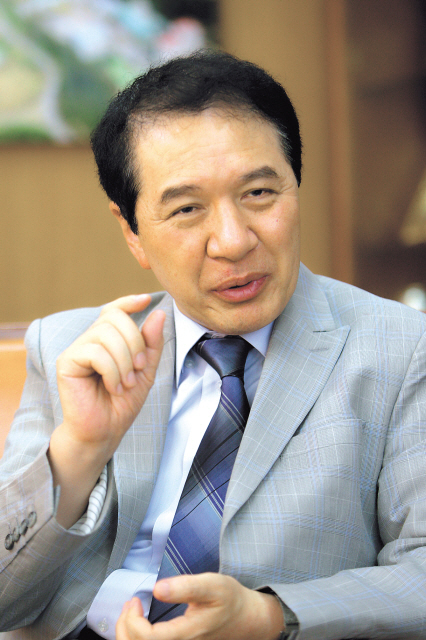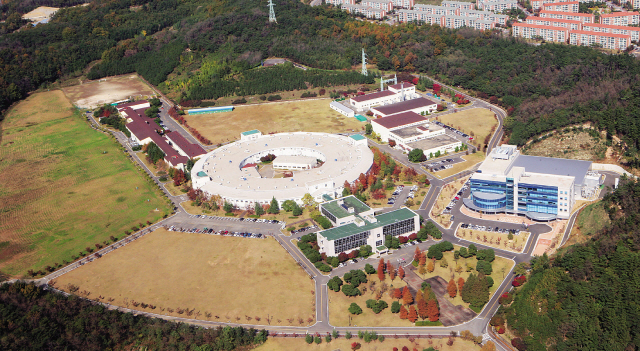President Kim Yong-min emphasizes balance between education and research
POHANG, Gyeonggi Province ― When Professor Kim Yong-min returned to Korea last year after nearly 30 years on the faculty of the University of Washington, he had a self-imposed mission: to build a truly world-leading university in Korea.
In less than a year, the president of Pohang University of Science and Technology has already made strides toward that goal. The school topped Times Higher Education’s list of the world’s best universities under 50 years old in June.
“It was a difficult decision for me to give up my 29-year career as a faculty member, and my friends and colleges based in Seattle and nearby,” Kim said in an interview with The Korea Herald.
“But I wanted to come back to serve Korea by using my talent and experience to make a Korean university to take leadership in the 21st century.”
POHANG, Gyeonggi Province ― When Professor Kim Yong-min returned to Korea last year after nearly 30 years on the faculty of the University of Washington, he had a self-imposed mission: to build a truly world-leading university in Korea.
In less than a year, the president of Pohang University of Science and Technology has already made strides toward that goal. The school topped Times Higher Education’s list of the world’s best universities under 50 years old in June.
“It was a difficult decision for me to give up my 29-year career as a faculty member, and my friends and colleges based in Seattle and nearby,” Kim said in an interview with The Korea Herald.
“But I wanted to come back to serve Korea by using my talent and experience to make a Korean university to take leadership in the 21st century.”


Kim was inaugurated as president of POSTECH in Pohang, North Gyeongsang Province, in September 2011. He is one of the world’s leading authorities in electronic engineering, especially in medical imaging.
At the University of Washington, Kim directed the Image Computing Systems Laboratory, a lab that focuses on medical imaging, image processing and computer architecture.
He has received many honors, including the 2011 William J. Morlock Award from the Institute of Electrical and Electronics Engineers, the world’s largest professional association in the field based in New York City.
Kim said he believed that for Korea to count itself as a “truly advanced nation,” it should have at least one or two world-class universities.
“I saw the promising future in POSTECH, and I wanted to make it a truly world-leading institution.”
POSTECH was founded in 1986 with investment from POSCO, one of the world’s biggest steel companies, with the aim of boosting the nation’s power in science and technology.
POSTECH is a small institution with fewer than 270 faculty members, and it admits only 320 undergraduates a year.
The small scale has its advantages. POSTECH grants full-tuition scholarships and accommodations to all undergraduates.
“We also provide a highly personalized and hands-on learning experience for all students,” Kim said.
Despite its relatively short history, POSTECH is already recognized internationally. After topping THE’s “Top 100 Under 50” list in June, it also ranked first on Switzerland’s Ecole Polytechnique Federale de Lausanne.
The Hong Kong University of Science and Technology came in third, while another Korean university, the Korea Advanced Institute of Science and Technology, came in fifth.
Currently, according to the Times Higher Education World University Rankings 2011-2012, POSTECH is 53rd in the world, the best institution in Korea and sixth in Asia overall.
Kim mentioned strong “financial support” and “school governance” as critical factors behind its success.
“We’re seeing the result of the earlier commitment and vision. We’ve had a lot of investment from POSCO and also from the government,” he said.
Specialization is also a key to the rapid progress in a relatively short space of time, Kim added.
POSTECH has concentrated in particular on high-energy physics and synchrotron radiation research with its Pohang Accelerator Laboratory, which holds the country’s first synchrotron light accelerator, completed in 1994.
The accelerator generates strong beams of light that are used for a range of scientific research, including biology, chemistry and engineer ing.
Currently, more than 1,000 experiments are conducted at the facility in a year, producing an average of 400 Science Citation Index papers annually, according to the university.
Kim noted that POSTECH is now building, in accordance with the Ministry of Education and Science and Technology, a fourth-generation synchrotron radiation.
The new light source that uses an X-ray laser at femtosecond time scales ― one quadrillionth of a second ― will enable researchers to study molecules in real time and follow chemical reactions as they happen.
“It will allow us to conduct truly revolutionary experiments and find breakthroughs,” Kim added.
With its advanced resources, POSTECH has already attracted interest from outside of the country. In 2010, it agreed with Max Planck Society, Germany’s most successful scientific research organization, to set up a joint institution at POSTECH.
“Max Planck has only few partner institutions outside of Germany. But we’re working to make this Max Planck Institution in POSTECH a full partner institution in the next three or four years, which will allow us very high-quality collaboration,” Kim said.
He said one of his main focuses in POSTECH is balancing education and research.
Kim pointed out that many universities in Korea put heavy emphasis on research while neglecting education. But he said he believes that developing a culture of excellence in research is usually the result of strong education.
He mentioned that voluntary work and character education are core courses at POSTECH.
“I believe for a scientist, honesty and integrity are absolutely essential. And we’re trying to teach our students to develop such a character,” he added.
But Kim said personality education is a long-term endeavor. “It can’t not be done in six months or a year, but we need to go there even though it’s not easy.”
“I believe the character education is very important for our students to become global leaders in 10 or 20 years,” he added.
Kim said his vision is to make POSTECH a truly world-leading research institution, such as the California Institute of Technology and Massachusetts Institute of Technology.
“We have made progress in the past 25 years, but now we need to make further major progress in next 20 or 25 years,” he added.
Kim Yong-min
● Kim was named president of POSTECH in September in 2011. He worked as a professor and chair of the Department of Bioengineering at University of Washington from 1982-2011.
● He was also named in 1996 a fellow of the Institute of Electrical and Electronics Engineers, a professional association that is dedicated to advancing technology.
● Kim graduated from Seoul National University with a bachelor’s degree in Electronics Engineering in 1975 and earned his doctoral degree at University of Wisconsin-Madison in 1982.
● Kim, who specializes in medical imaging and computing, has received many honors during his career, most recently the 2011 William J. Morlock Award from the IEEE.
By Oh Kyu-wook (596story@heraldcorp.com)
-
Articles by Korea Herald








![[Kim Seong-kon] Democracy and the future of South Korea](http://res.heraldm.com/phpwas/restmb_idxmake.php?idx=644&simg=/content/image/2024/04/16/20240416050802_0.jpg&u=)








![[KH Explains] Hyundai's full hybrid edge to pay off amid slow transition to pure EVs](http://res.heraldm.com/phpwas/restmb_idxmake.php?idx=652&simg=/content/image/2024/04/18/20240418050645_0.jpg&u=20240418181020)

![[Today’s K-pop] Zico drops snippet of collaboration with Jennie](http://res.heraldm.com/phpwas/restmb_idxmake.php?idx=642&simg=/content/image/2024/04/18/20240418050702_0.jpg&u=)